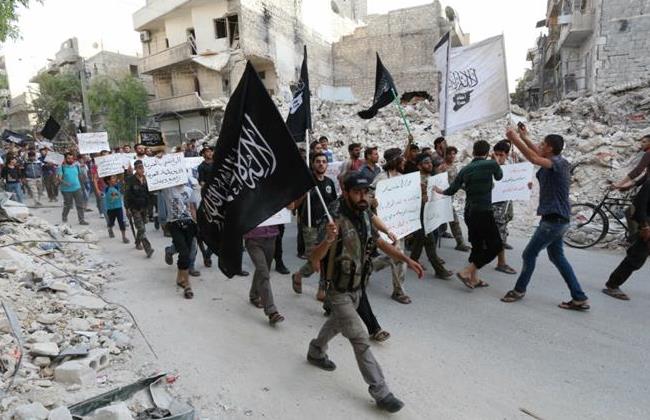Western Europe’s retreat from religion provides vacuum for ISIS recruitment

dailystar.com.lb
As young people ask questions about the meaning of life and seek to discover a meaning and purpose for their own lives, the place once occupied by the church is, more and more, now empty.
Allan Brownfeld Global News Centre
(WASHINGTON DC) Terrorist attacks in such Western European cities as Paris, Copenhagen and Brussels indicate that the threat of radical Islam is growing in the heart of Europe. About four thousand Europeans have gone to fight with ISIS in Syria since the outbreak of war in 2011. Writing in The New Yorker, in an article entitled “Journey to Jihad,” Ben Taub notes that, “The migration of youths from seemingly stable and prosperous communities to fight with radical Islamists has bewildered not only their families but governments and security forces throughout Europe.”
There are militant groups throughout Western Europe promoting the introduction of Sharia law not only in Syria and Iraq but in Europe itself. One of these is Sharia4Belgium whose stated mission is to transform Belgium into a state governed as the cities of Rappa, in Syria, and Mosul, in Iraq, are today. It would replace the parliament with a shura council and the Prime Minister with a caliph. Under its rule, adulterers would be stoned and homosexuals would be executed. All non-Muslims would be converted or banished or forced to pay jizya, a tax levied on those who don’t adhere to the faith.
Maajid Nawaz, a former Islamist recruiter who now runs a counter-extremist think-tank in London called Quilliam, says that, “Typical recruitment patterns in Europe and the West tell us that it helps if that person doesn’t have a religious background.” Converts and the newly devout, he said, are “dislocated from the traditional hierarchies” of Islam, and are less likely to challenge a self-proclaimed authority on religious matters.
The rule imposed by ISIS on the areas it has conquered is brutal. In Raqqa, Syria, women must wear a niqab, men must not have pictures on their T-shirts, smoking is banned, shops must shut for the five prayer times, and only women can work in women’s clothing shops. Since August 2014, women need a mahram, a male companion, to go out. Sara Birke, Middle East correspondent for The Economist, reports that, “Residents said they were terrified of the group’s horrific punishments. In a central square in Rappa, heads are posted on spikes with a sign above them indicating what transgression was involved. The square used to be called Sahat al-Naem, or paradise, but is now called Sahat al-Jaheem, or hell; the doctor I met told me she took a route to work that took three times as long just to avoid it…A former teacher from Manbij, an ISIS-controlled town northeast of Aleppo, told me, almost in disbelief, how he watched the beheading of a man who had accidentally driven into ISIS territory while smoking and then tried to claim it was not banned in Islam after being caught.”
Western Europe may be a particularly fertile field for radical Islam as it retreats from its own religious faith and tradition, providing a vacuum in which militant Islam can appeal to young people in search of spirituality and religion. As young people ask questions about the meaning of life and seek to discover a meaning and purpose for their own lives, the place once occupied by the church is, more and more, now empty.
In an essay, “The Decline of European Christianity,” John Christy writes: “A once thriving metropolis of Christian faith, today most of Europe has become a secular society governed by the laws of humanism under the guise of naturalistic belief. Countries such as France and Sweden are among the highest percentage of people today who explicitly deny the existence of God at 40% and 34% respectively and only 27% and 18% who still hold belief, which leaves a large population in the middle that is ambiguous.”
USA Today’s Noelle Knox reports that, “In Sweden and throughout Scandinavia, the decline of the church also has been matched by the drop in the number of marriages. There is virtually no social stigma for unmarried parents. More than half the children born in Sweden and Norway are born to unmarried mothers, The EU reports. In Denmark it’s 45%.”
According to The Wall Street Journal, “The closing of Europe’s churches reflects the rapid weakening of the (Christian) faith in Europe, a phenomenon that is painful to both worshipers and others who see religion as a unifying factor in a disparate society. By example, the Netherlands is expected to close two-thirds of its Roman Catholic Churches in the next decade.”
The Pew Research Center data highlights the degree to which the European population reports no religious affiliation: France (28%), Germany (24%), Italy (12.4%), Netherlands (42.1%), United Kingdom (21.3 %). Just 51% of the citizens in the EU’s 27 nations said they believed in God in a 2010 survey. In Sweden, Estonia and the Czech Republic, that number fell below 20%.
In the 20 years up to 2010, the Evangelical Church of Germany closed 340 churches and is considering giving up another 1,000 according to the newsweekly Der Speigel. Dutch churches are closing at a rate of two a week. Only 4,000 remain from the estimated 19,000 built since the 13th century. The former Roman Catholic Church of St. Joseph in Arnhem, the Netherlands, has been converted into a skate board park.
One religion in Europe is growing, and is attracting increasing numbers of young converts. That religion is Islam. On average, Muslims make up 3.8% of the population of the nations of the EU, according to the Pew Research Center. Pew predicts that the Muslim population of 17 Western European countries would grow from 4.5% in 2010 to 7.1% by 2030, due to immigration and a high birth rate. Most of these Muslims do not adhere to the radical Islamist view which leads to an active pursuit of converts who will engage in terrorist acts. But a small number do, and have been quite successful, in part because of the vacuum created by Europe’s abandonment of religion.
In our own Western tradition, religion was always considered to be of primary importance. Edmund Burke declared that, “We know, and it is our pride to know, that man is by his constitution, a religious animal…We know, and what is more important, we inwardly feel that religion is the basis of civil society and the source of all good, and of all comfort.” Benjamin Disraeli said: “The most powerful principle which governs man is the religious principle. Man was made to adore and obey.” And Francis Bacon in his “Essays on Atheism,” makes the point that, “I had rather believe all the fables in the legends and the Talmud and the Alcoran, than that this universal frame is without a mind…A little philosophy induceth men’s minds to atheism, but depth in philosophy bringeth men’s minds about to religion.” In G.K. Chesterton’s view, “The danger of loss of faith in God is not that one will then believe in nothing, but rather that one will believe in anything.”
As Western Europe moves away from the religious traditions which sustained it, the new generation, will find itself adrift with regard to the questions religion traditionally addresses. For some, living in a materially comfortable society in which marriage is no longer the norm, in which the welfare state provides for most material needs, in which drug use is growing, will provide no challenge. For others, however, there will be a spiritual search for the meaning of life and a desire to devote oneself to something beyond material comfort. Into this vacuum, militant Islam is ready to enter, with a religious ideology which is all encompassing, and eager to welcome newcomers. Those jihadists from Belgium, France, Denmark and other European countries now fighting with ISIS in the Middle East may be the tip of a larger iceberg. Europe has largely left itself naked before its enemies. And we in the United States may not be far behind.
__________________________________
Allan C. Brownfeld received his B.A. degree from the College of William and Mary, his J.D. degree from the Marshall-Wythe School of Law of the College of William and Mary and his M.A. in Government and Politics from the University of Maryland. He has served on the faculties of St. Stephen’s Episcopal School, Alexandria, Virginia, and the University College of the University of Maryland.
The recipient of a Wall Street Journal Foundation Award, Mr. Brownfeld has written for such newspapers as THE HOUSTON PRESS, THE RICHMOND TIMES DISPATCH, THE WASHINGTON EVENING STAR and THE CINCINNATI ENQUIRER. For many years he wrote three columns a week for such newspapers as THE PHOENIX GAZETTE, THE MANCHESTER UNION LEADER, and THE ORANGE COUNTY REGISTER. His weekly column appeared for more than a decade in ROLL CALL, the newspaper of Capitol Hill. His articles have appeared in such journals as THE YALE REVIEW, THE TEXAS QUARTERLY, THE NORTH AMERICAN REVIEW, ORBIS and MODERN AGE.
Mr. Brownfeld served as a member of the staff of the U.S. Senate Internal Security Subcommittee and was the author of that committee’s 250-page study of the New Left. He has also served as Assistant to the Research Director of the House Republican Conference and as a consultant to such members of Congress as Reps. Phil Crane (R-Il) and Jack Kemp (R-NY) and to the Vice President of the United States.
He is a former editor of THE NEW GUARD and PRIVATE PRACTICE, the journal of the Congress of County Medical Societies and has served as a Contributing Editor AMERICA’S FUTURE and HUMAN EVENTS. He served as Washington correspondent for the London-based publications, JANE’S ISLAMIC AFFAIRS ANALYST and JANE’S TERRORISM REPORT. His articles regularly appear in newspapers and magazines in England, South Africa, Sweden, the Netherlands and other countries. You can write to Allan at [email protected]



















 London
London
 Oregon
Oregon





Leave a Reply
You must be logged in to post a comment.